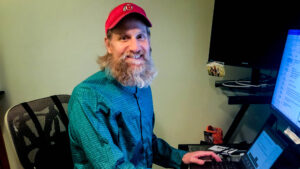 In the last days of February, Covid-19 still seemed a far-away threat to most in Utah, but Dr. Steve Burian was watching closely as international airports began issuing travel restrictions. He had recently returned home from meeting with research partners in Pakistan and was days away from a trip to Egypt to further a Water-Energy-Food nexus project with a group of Fulbright grant recipients.
In the last days of February, Covid-19 still seemed a far-away threat to most in Utah, but Dr. Steve Burian was watching closely as international airports began issuing travel restrictions. He had recently returned home from meeting with research partners in Pakistan and was days away from a trip to Egypt to further a Water-Energy-Food nexus project with a group of Fulbright grant recipients.
Burian, a civil and environmental engineering professor at the U, is also director of the U Water Center. He’s spent years nurturing global partnerships that advance water security initiatives and inform his teaching. Burian is also passionate about faculty development and was looking forward to delivering an ambitious summer training with the Higher Education Commission (HEC) in Pakistan aimed at preparing newly minted Ph.D.s for the life of a professor.
Like everyone, adapting to the realities of a pandemic would require Burian to pivot.
As travel restrictions made it clear he would not be going to Egypt, Pakistan, or anywhere else for that matter, Burian quickly got to work setting up his home office to support the virtual transition of coursework, advising, research, and facilitation of workshops a world away.
In many ways, Burian was well-equipped to handle the distance learning and collaboration that became ubiquitous when the Covid crisis response was activated. For the past five years, Burian has overseen the Utah-arm of the USAID-funded U.S.-Pakistan Center for Advanced Studies in Water. When daylight dawns in Mountain Standard Time, he’s usually on campus for meetings and classes and, as night settles in the Salt Lake Valley, Burian logs on to video calls with colleagues just waking up in Pakistan. Sustaining such global partnerships requires creativity and communication, even in the best of times. Colleagues must carefully consider time zones, get comfortable with odd-hour meetings, and deftly maneuver digital tools and sometimes-spotty internet.
“It’s definitely time-consuming and a constant balance,” he notes. “But I love the opportunity to interact with people like this. It’s always interesting to me. This type of work builds connections and opportunities that feed back into the U–I see international activity as part of my job and in line with the U’s mission to create global impact.”
This summer Burian has followed through on that commitment and found a way to make good on the HEC professor training in Pakistan he had planned—in spite of the pandemic. “It was, of course, designed to be delivered in-person. Everything was organized and ready to go,” said Burian. Initially, the four instructors involved discussed transitioning the curriculum to an asynchronous course. “But in the end, we just knew it really had to be live,” said Burian.
The team—based in Canada, Pakistan, and the United Kingdom—decided to take turns leading the live virtual seminars and meticulously set up a trove of interactive shared documents and presentations. Together, they’ve guided over 150 doctorate recipients for 10-hours a day, 6 days a week, in teaching and research best practices, writing funding proposals, leveling-up their English proficiency, and managing the varied demands of professorship.
The hours are long and late–Burian admits he currently sleeps between one and six a.m.—but building the professional strengths of Pakistan’s next generation of professors is personally rewarding and gives back to his work at the U.
“We’ve worked through so many aspects of online instruction through this course. It’s definitely benefitting me, and I look forward to helping my colleagues by sharing what we’ve learned,” Burian said.
He recalled participating in an American Society of Civil Engineers Teacher Training Workshop earlier in his career, being selected as a mentor, and subsequently falling in love with faculty development. “I thought ‘well, this is pretty fun’ and I realized how much it was helping me as a teacher and research professional,” said Burian. Thus, in spite of the odd hours, virtual gymnastics, and other hurdles the pandemic has tossed, he perseveres in passing the proverbial torch.
“I, too, get better every day by participating in work like this,” Burian said.
– Cecily Sakrison